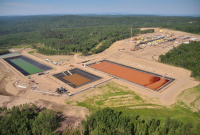Support strong Canadian climate journalism for 2025
A new $40-billion investment in a fossil fuel plant in B.C. is expected to be formally announced this week, according to reports.
Owned by LNG Canada, a joint venture that includes Royal Dutch Shell, Petronas, Mitsubishi Corporation, Petrochina and Korea Gas Corporation, the liquefied natural gas project is expected to be built in the Kitimat area and would be the largest infrastructure development in the province's history. Liquefied natural gas is gas that has been compressed to be transported.
Industry leaders suggest the project's realization could usher in further investments in more natural gas plants in the region. A final investment decision on the plant is also expected to trigger the start of construction on partner TransCanada's Coastal GasLink pipeline, which would carry natural gas from the Dawson Creek, B.C. area to the west coast.
John Horgan's government has been starkly opposed to the bitumen-carrying Trans Mountain pipeline expansion. But the premier appears to be more optimistic about the financial gains that LNG Canada could provide.
“We’ll see what LNG Canada does, but should they proceed with the final investment decisions, it will be certainly significant for our province,” he told Global News on Sept. 26. “It will allow more revenues to come to the Crown to be distributed throughout the province to the people who need services. [It will] help health care, housing, you name it. So it’s definitely going to be good news for British Columbia should they proceed.”
NDP support for the pipeline could divide the ruling NDP and the B.C. Greens, whose support Horgan needs to maintain government.
Green Leader Andrew Weaver has said it will be impossible to reduce greenhouse gas emissions by 40 per cent by 2030 and 80 per cent by 2050 if LNG is built.
Weaver declined to comment on this article before the investment is officially announced.
Calls to Shell, the B.C. NDP and the mayor of Kitimat were not returned.
Karen Tam Wu, B.C. director of the Pembina Institute, a Canadian sustainable energy think-tank, told National Observer the B.C. government must reconcile LNG’s carbon pollution with the province’s climate goals in their strategy plan.
“Without this, the LNG Canada project would take B.C. in the wrong direction. Natural gas is already B.C.’s biggest source of industrial carbon pollution. Indeed, the gas sector has a methane leak problem,” she wrote in an email.






Comments
Mother Nature better be prepared to rock and roll. Horizontal hydraulic fracturing will keep busy supplying the new LNG industry. Our planet has a very sad future. Commerce trumps our environment. Mr. Horgan turns out to be a Clark clone.
More urgent than ever: Greens must take the helm both provincially and federally. Enough with empty, dishonest promises!
This book released in June 2018 should be required reading by all politicians in Canada. Yes, it is that important. Mr. Horgan has decided to knowingly sacrifice our planet for the benefit of corporations. To counter by saying look at the jobs it will provide is to ignore the destruction to Mother Nature.
Amity and Prosperity: One Family and the Fracturing of America
by Eliza Griswold
https://www.goodreads.com/book/show/36722972-amity-and-prosperity#other…
Prize-winning poet and journalist Eliza Griswold's Amity and Prosperity is an expose on how fracking shattered a rural Pennsylvania town, and how one lifelong resident brought the story into the national spotlight. This is an incredible true account of investigative journalism and a devastating indictment of energy politics in America.
So, here we go again! With one hand, the NDP stands against TMX ..... this, if successful, will reduce GHGs (in order to save our home, Planet Earth). That’s a good thing, right?
With the other hand, BC NDP stands FOR the LNG ( which, will greatly increase GHGs, desecrate more of the land and imperil the future for our children and their children, not to forget, the many extinctions of animals, birds, fish and our lands, air and waters.
So exactly what is the point?
We are facing an existential crisis here.
We need our politicians to stand on the side of history that safeguards our children’s chances of a decent future.
We thought we had one.
So sad .... I was a loyal CCF, then NDP member and activist.
But for years now, the NDP ( and the Liberals) have let us all down. And what opportunities have been missed ... to make a difference!
I have, for almost a decade now, supported the Green Party. Elizabeth May, party leader, is aware, passionate and consistently educating, writing policy papers, taking science-based decisions on climate as well as on justice and inequality.
The Green Party is the only party to be consistently on the side of history that will benefit us all, not just the few ( and wealthiest).
Why not give it a try next time you vote?
I’m not suggesting the Greens, right now, will BECOME government, but each voice in the Legislature or Parliament is at least speaking out about creating a better future, and is not actively contributing to the destruction of our children’s future.
If not you, then who?
If not now, then when?